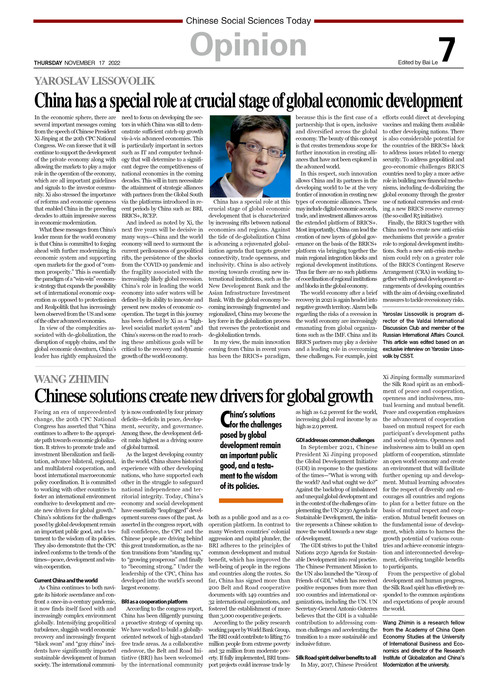Chinese solutions create new drivers for global growth
2022-11-17 16:07:58
Facing an era of unprecedented change, the 20th CPC National Congress has asserted that “China continues to adhere to the appropriate path towards economic globalization. It strives to promote trade and investment liberalization and facilitation, advance bilateral, regional, and multilateral cooperation, and boost international macroeconomic policy coordination. It is committed to working with other countries to foster an international environment conducive to development and create new drivers for global growth.” China’s solutions for the challenges posed by global development remain an important public good, and a testament to the wisdom of its policies. They also demonstrate that the CPC indeed conforms to the trends of the times—peace, development and win-win cooperation.
Current China and the world
As China continues to both navigate its historic ascendance and confront a once-in-a-century pandemic, it now finds itself faced with and increasingly complex environment globally. Intensifying geopolitical turbulence, sluggish world economic recovery and increasingly frequent “black swan” and “gray rhino” incidents have significantly impacted sustainable development of human society. The international community is now confronted by four primary deficits—deficits in peace, development, security, and governance. Among these, the development deficit ranks highest as a driving source of global turmoil.
As the largest developing country in the world, China shares historical experience with other developing nations, who have supported each other in the struggle to safeguard national independence and territorial integrity. Today, China’s economy and social development have essentially “leapfrogged” development success cases of the past. As asserted in the congress report, with full confidence, the CPC and the Chinese people are driving behind this great transformation, as the nation transitions from “standing up,” to “growing prosperous” and finally to “becoming strong.” Under the leadership of the CPC, China has developed into the world’s second largest economy.
BRI as a cooperation platform
According to the congress report, China has been diligently pursuing a proactive strategy of opening up. We have worked to build a globally-oriented network of high-standard free trade areas. As a collaborative endeavor, the Belt and Road Initiative (BRI) has been welcomed by the international community both as a public good and as a cooperation platform. In contrast to many Western countries’ colonial aggression and capital plunder, the BRI adheres to the principles of common development and mutual benefit, which has improved the well-being of people in the regions and countries along the routes. So far, China has signed more than 200 Belt and Road cooperative documents with 149 countries and 32 international organizations, and fostered the establishment of more than 3,000 cooperative projects.
According to the policy research working paper by World Bank Group, The BRI could contribute to lifting 7.6 million people from extreme poverty and 32 million from moderate poverty. If fully implemented, BRI transport projects could increase trade by as high as 6.2 percent for the world, increasing global real income by as high as 2.9 percent.
GDI addresses common challenges
In September 2021, Chinese President Xi Jinping proposed the Global Development Initiative (GDI) in response to the questions of the times—“What is wrong with the world□ And what ought we do□” Against the backdrop of imbalanced and unequal global development and in the context of the challenges of implementing the UN 2030 Agenda for Sustainable Development, the initiative represents a Chinese solution to move the world towards a new stage of development.
The GDI strives to put the United Nations 2030 Agenda for Sustainable Development into real practice. The Chinese Permanent Mission to the UN also launched the “Group of Friends of GDI,” which has received positive responses from more than 100 countries and international organizations, including the UN. UN Secretary-General Antonio Guterres believes that the GDI is a valuable contribution to addressing common challenges and accelerating the transition to a more sustainable and inclusive future.
Silk Road spirit deliver benefits to all
In May, 2017, Chinese President Xi Jinping formally summarized the Silk Road spirit as an embodiment of peace and cooperation, openness and inclusiveness, mutual learning and mutual benefit. Peace and cooperation emphasizes the advancement of cooperation based on mutual respect for each participant’s development paths and social systems. Openness and inclusiveness aim to build an open platform of cooperation, stimulate an open world economy and create an environment that will facilitate further opening up and development. Mutual learning advocates for the respect of diversity and encourages all countries and regions to plan for a better future on the basis of mutual respect and cooperation. Mutual benefit focuses on the fundamental issue of development, which aims to harness the growth potential of various countries and achieve economic integration and interconnected development, delivering tangible benefits to participants.
From the perspective of global development and human progress, the Silk Road spirit has effectively responded to the common aspirations and expectations of people around the world.
Wang Zhimin is a research fellow from the Academy of China Open Economy Studies at the University of International Business and Economics and director of the Research Institute of Globalization and China’s Modernization at the university.


